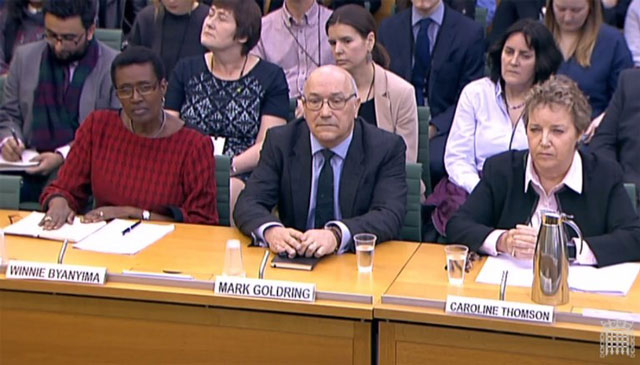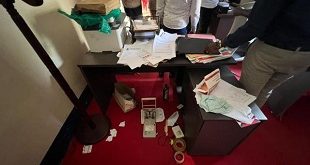
London, UK | THE INDEPENDENT | Oxfam International Executive Director Winnie Byanyima has appeared before the UK Parliament’s International Development Committee, where she said her priority now is to ensure no more mistakes are made by the British Charity, and that their work of saving lives around the world goes on.
Byanyima together with Oxfam GB’s Executive Director Mark Goldring and Chair of Trustees Caroline Thomson told a parliamentary committee in London on Tuesday they were investigating 26 new cases of sexual misconduct which had been reported since a scandal broke earlier this month over its handling of a 2011 case in Haiti.
“I was grateful today to have the chance with my Oxfam GB colleagues to assist the UK Parliament in publicly examining our failings in the protection of vulnerable women following our 2010 humanitarian response in Haiti. I thank the UK Select Committee for the fair and robust hearing that we received,” Byanyima said in a statement after.
“I pledge that Oxfam will do everything it can to contribute to the global movement to protect women and girls. We have offered our deepest apologies to the people of Haiti and are working with the Haitian government.”
Byanyima last week announced a new global plan of action to change Oxfam’s culture and improve safeguarding practices, including establishing an independent commission, increasing investment and resources into safeguarding teams, and strengthening our confidential whistle-blowing mechanisms.
“I have two priorities today: first, to make sure we never make the same mistakes again. Second, that our work of saving lives around the world goes on,” said Byanyima.
She confirmed that people have already begun to respond to these measures, with new reports of abuse and exploitation being brought to their attention in the past ten days. “If people have previously felt unable to report abuse or exploitation that they have seen or experienced, then I hope they too will come forward. We will listen and we will act,” she said.
“Oxfam is rightly under close scrutiny by many people today around the world. We hope that our apologies – but far more importantly our deeds and the steps we are taking – will begin to restore people’s trust in us.”
Byanyima said she is saddened that Oxfam’s work around the world, including in Haiti where they have worked for 40 years “has been marred by the actions of a group of men who abused the power they held over vulnerable women, but also by our own failings at the time.”
Oxfam probes new sexual misconduct cases as MPs grill bosses
At Tuesday’s parliamentary committee, Oxfam revealed it was investigating 26 new cases of sexual misconduct since the crisis erupted over its handling of a 2011 prostitution scandal in Haiti, which the British charity called a “wake-up call”.
Chief executive Goldring told the parliamentary committee in London that the cases varied in their seriousness, while 16 related to its international operation.
“They range in time frame from more recent events to long historic events where people did not report them at the time,” he said.
Goldring added he believed the latest cases had emerged as “a direct response to the publicity” around the Haitian scandal.
“We really want people to come forward,” he added.
The Oxfam chief was unable to provide further details on the cases when pressed by British lawmakers.
The committee said it would be conducting its own inquiry into abuses in the foreign aid sector.
Three of Oxfam’s most senior leaders repeatedly apologised for the charity’s handling of an internal investigation into the use of prostitutes by staff in Haiti following the devastating 2010 earthquake.
Caroline Thomson, chair of trustees, said: “It’s right to admit this has been a real wake-up call.”
The charity revealed 7,000 regular donors had been lost since the scandal emerged following reporting by The Times newspaper.
It said safeguards had been put in place following the 2011 probe, but admitted they had not gone far enough.
Thomson vowed to take “personal responsibility” for ongoing reform: “I have decided that we need to have more focus on safeguarding.”
Last week, Oxfam unveiled an action plan to tackle sexual harassment and abuse, including creating a new vetting system for staff.
The charity formally also apologised to Haiti on Monday over the scandal and for failing to report the matter adequately.
“Oxfam should have reported the matter to the Haitian authorities,” Goldring told lawmakers.
“It was not for Oxfam to decide whether a crime had been committed… that was the wrong decision.”
– Tip of the iceberg? –
Oxfam had made public Monday its 2011 report into the episode, revealing that three staff had physically threatened a witness in the prostitution investigation.
The report, compiled in the year after the workers were deployed to Haiti, found that a total of seven staff were accused of using prostitutes at an Oxfam-funded residence.
Four staff were fired for gross misconduct and three others, including then country director Roland Van Hauwermeiren, were allowed to quit.
Stephen Twigg, chair of the international aid committee hearing the testimony Tuesday, was blunt in his assessment.
“Demonstrably, you have got to get your house in order,” he told its leadership.
As part of its broader probe into sexual misconduct in the sector, the panel also questioned Kevin Watkins, chief executive of Save the Children UK.
He revealed tentative figures that the charity dealt with 193 cases of “child safeguarding” issues in 2016, leading to 53 full investigations, 20 case referrals to police and 11 staff dismissals.
“The difficult thing to know in these circumstances is whether you’re catching the tip of the iceberg or whether you’re catching the iceberg itself,” Watkins said.
Oxfam’s Immediate Response Actions by The Independent Magazine on Scribd
 The Independent Uganda: You get the Truth we Pay the Price
The Independent Uganda: You get the Truth we Pay the Price


